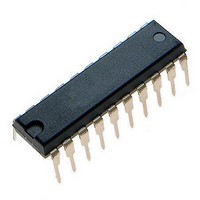MCR908JK1ECPE Freescale Semiconductor, MCR908JK1ECPE Datasheet - Page 69

MCR908JK1ECPE
Manufacturer Part Number
MCR908JK1ECPE
Description
IC MCU 1.5K FLASH 8MHZ 20-DIP
Manufacturer
Freescale Semiconductor
Series
HC08r
Datasheet
1.MC908JK1ECDWE.pdf
(180 pages)
Specifications of MCR908JK1ECPE
Core Processor
HC08
Core Size
8-Bit
Speed
8MHz
Peripherals
LED, LVD, POR, PWM
Number Of I /o
14
Program Memory Size
1.5KB (1.5K x 8)
Program Memory Type
FLASH
Ram Size
128 x 8
Voltage - Supply (vcc/vdd)
2.7 V ~ 3.3 V
Data Converters
A/D 12x8b
Oscillator Type
External
Operating Temperature
-40°C ~ 85°C
Package / Case
20-DIP (0.300", 7.62mm)
Processor Series
HC08JK
Core
HC08
Data Bus Width
8 bit
Data Ram Size
128 B
Maximum Clock Frequency
8 MHz
Number Of Programmable I/os
15
Number Of Timers
2
Maximum Operating Temperature
+ 85 C
Mounting Style
Through Hole
Development Tools By Supplier
FSICEBASE, DEMO908JL16E, M68CBL05CE
Minimum Operating Temperature
- 40 C
On-chip Adc
8 bit, 12 Channel
Lead Free Status / RoHS Status
Lead free / RoHS Compliant
Eeprom Size
-
Connectivity
-
Lead Free Status / Rohs Status
Details
Available stocks
Company
Part Number
Manufacturer
Quantity
Price
Company:
Part Number:
MCR908JK1ECPE
Manufacturer:
Freescale Semiconductor
Quantity:
135
6.4 I/O Signals
The following paragraphs describe the oscillator I/O signals.
6.4.1 Crystal Amplifier Input Pin (OSC1)
OSC1 pin is an input to the crystal oscillator amplifier or the input to the RC oscillator circuit.
6.4.2 Crystal Amplifier Output Pin (OSC2/PTA6/RCCLK)
For the X-tal oscillator device, OSC2 pin is the output of the crystal oscillator inverting amplifier.
For the RC oscillator device, OSC2 pin can be configured as a general purpose I/O pin PTA6, or the
output of the internal RC oscillator clock, RCCLK.
6.4.3 Oscillator Enable Signal (SIMOSCEN)
The SIMOSCEN signal comes from the system integration module (SIM) and enables/disables the X-tal
oscillator circuit or the RC-oscillator.
6.4.4 X-tal Oscillator Clock (XTALCLK)
XTALCLK is the X-tal oscillator output signal. It runs at the full speed of the crystal (f
directly from the crystal oscillator circuit.
and OSC2 and may not represent the actual circuitry. The duty cycle of XTALCLK is unknown and may
depend on the crystal and other external factors. Also, the frequency and amplitude of XTALCLK can be
unstable at start-up.
6.4.5 RC Oscillator Clock (RCCLK)
RCCLK is the RC oscillator output signal. Its frequency is directly proportional to the time constant of the
external R and C.
the actual circuitry.
6.4.6 Oscillator Out 2 (2OSCOUT)
2OSCOUT is same as the input clock (XTALCLK or RCCLK). This signal is driven to the SIM module and
is used to determine the COP cycles.
6.4.7 Oscillator Out (OSCOUT)
The frequency of this signal is equal to half of the 2OSCOUT, this signal is driven to the SIM for generation
of the bus clocks used by the CPU and other modules on the MCU. OSCOUT will be divided again in the
SIM and results in the internal bus frequency being one fourth of the XTALCLK or RCCLK frequency.
Freescale Semiconductor
MC68HRC908JL3E/JK3E/JK1E
MC68HC908JL3E/JK3E/JK1E
Figure 6-2
Device
shows only the logical relation of RCCLK to OSC1 and may not represent
MC68HC908JL3E Family Data Sheet, Rev. 4
Figure 6-1
Oscillator
X-tal
RC
shows only the logical relation of XTALCLK to OSC1
PTA6EN = 0: RCCLK output
PTA6EN = 1: PTA6 I/O
Controlled by PTA6EN bit in PTAPUER ($0D)
OSC2 pin function
Inverting OSC1
XCLK
) and comes
I/O Signals
69











